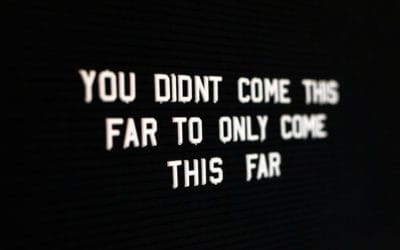I am often asked by medical students trying to choose a residency, “Do you still get excited by what you do? Do you still love your job? Are you bored?” These are obviously complex questions to answer. What these students are really trying to ask is “how common is burnout in your specialty?”
All medical students want to know if they will still love the job in 20-30 years.
They have witnessed physician burnout. And they are afraid of burnout out, too. It doesn’t go unnoticed.
Am I Burned Out?
I used to think this topic was a “soft” topic that people only discussed if they had “issues”.
Then, I started to realize that all of us have problems or know someone that does. We can continue to ignore these topics and pretend they aren’t a problem, or we can step up and combat the issue head on.
Before we do that, though, we have to know the enemy.
The idea of burnout was introduced in the 1970s by Herbert Freudenberg. It is a downward spiral that begins with poor work-life balance, multiple stressors, and declining mental status.
The Maslach Burnout Inventory (MBI)-Human Services Survey is the most commonly used tool to measure burnout. It consists of three main components.
- Emotional Exhaustion. This is a measure of feelings of being emotionally overextended and exhausted by work.
- Depersonalization. This measures impersonal responses toward people receive your car or instruction.
- Personal accomplishment. This part describes feelings of competence and successful achievement in one’s work.
From this, you could infer that the symptoms of burnout manifest as any of the following: Feeling detached at work. Overextended at work. You might find that work is exhausting. Burned out doctors treat other people as objects/things rather than people. You might lose compassion or empathy for patients.
It also causes people to feel bad at their job. This isn’t imposter syndrome. It is a legitimate feeling of incompetence.
How Common is Burnout?
Burnout matters to those who suffer from it, and the families that suffer with them. The prevalence continues to increase with each passing Medscape burnout survey that is published.
Most of these studies show that burnout hovers between 40 and 53% in attending physicians.
How common is burnout in training?
Some estimates show that 27-75% of residents experience burnout.
Burnout has an effect on a lot of us!
In fact, almost 70% of surgical residents in one study suffered from burnout. Even scarier, 11% of that same cohort experienced suicidal ideation.
If these numbers are not concerning to you, maybe that is because you are at risk for burnout yourself. Or maybe you don’t care about wellness?
The Cost of Burnout
Another reason that we – and particularly administrators – should care about burnout is cost.
In a recent study out of Stanford, researchers determined that the cost of physician turnover (which is often attributed to burnout) can cost anywhere between $250,000-$1,000,000 depending on the specialty, expertise, and experience of the physician.
Let that sink in for a moment. That is a lot of money.
It also directly impacts patient care. It is a simple premise, but if your cup is not full you simply cannot fill up the cups of the other people you interact with, including your patients.
Using the same MBI survey mentioned above to detect burnout, one systematic review found that with increasing rates of burnout, patient errors increased and patient safety declined.
The authors also found that medical errors made by burnt out resident physicians could also lead to more burnout. Essentially, it worsens their personal view of achievements.
What can be done?
So, the problem is common and vast. It is also expensive.
How exactly do we fix burnout?
As with most problems there are systemic/systematic solutions and individualized solutions. Let’s take a look at both.
Systematic Solutions
If you are a young (or old) attending reading this, it is our responsibility to make wellness a priority in our training programs.
We must make it part of the every day interaction we have with residents and medical students. From the study above looking at the degree of burnout in surgical residents, the following is said:
“If higher stress is associated with increased risk of burnout in surgical trainees, and burnout is associated with diminished mental health and performance, then addressing stress and burnout among our trainees should be a priority.”
Systems based solutions may consist of the following:
- Annual wellness/burnout assessments, including the MBI survey or some other validated measurement tool.
- Empowering residents to admit to being burned out. And responding when it happens.
- Encouraging students, residents, and faculty to have conversations about wellness, burnout, and mental health issues.
- Form a wellness committee that is focused on diagnosing and solving burnouts at your particular institution.
Personal Solutions
While we certainly need to place system’s based wellness initiatives into practice, there is some onus on the individual to help promote wellness and prevent burnout in their own life.
How can we accomplish this?
- Involve our loved ones (spouse, significant other, children, family, and friends).
- Let people know when you are struggling so that they can help. Asking for help is not weak.
- Cutting back your clinical load. Sometimes people find that they love their jobs when they just do a little less of it.
- Eliminate the parts of your job you cannot stand (if possible).
- Deal with other causes of stress (e.g. financial stress – I’ve written a book that can help you sort out the personal finance aspect of burnout). This is one of the biggest reasons this site exists.
- Exercise and meditation has been linked to improvement in stress. Yes, it sounds corny. But it also works.
Take Home
Burnout is common and costly. The solution requires both systematic and personal problem solving.
The more we know about this beast, the more likely it is that we can slay it. I’d love to hear your thoughts and the solutions you have found helpful in your institutions and departments.
That way, we can one day tell all those students who ask about physician burnout, “That’s a thing of the past!”
What do you think? Are you burned out (burnt out?)? Does your practice or hospital have successful wellness initiatives? How do you combat burn out in your personal life?
TPP





Thanks for this article on such an important topic. Just getting the word out there is a big step in the right direction.
Thanks, Badger. I completely agree.
I have yet to see any substantial treatment of the systemic factors that lead to burnout and how they can be mitigated.
There a myriad of actions, large and small, that can mitigate against burnout, both for physicians and other health care workers.
I worked in a high-pressure, constant crisis clinical unit when the EHR was instituted. Secretaries were promptly terminated, as their value was considered to be order entry, which became automated in the EHR. No administrator felt that their modest salary in return for being “glue” people was of value for esprit-de-corps. Nothing could be further from the truth. Communication took a huge hit. I would be paged, call back and the phone would ring 15 times. Noone answered because it was not in their job description. When told that everyone answers phones, busy people still ignored the phones, because triaging the calls was a pure distraction from their official duties. this was a HUGE dissatisfier to all, and then the administration rewrote history, saying it was never a decision of theirs, RATHER, a choice was given; retain secretaries or nurses aides. Nurses voted to retain aides, so call lights would be answered. Bait and switch, “zero sum game”, someone wins, someone loses, but in this case EVERYONE loses. By all measures, the EHR made noone more efficient, and to terminate team members who DID make others more efficient was an insult to our intelligence AND humanity. I could go on, and on, and on…examples of egregious and callous neglect to the wellbeing of workers.
Systemic problems require systemic solutions plain and simple. That’s the only way this problem actually gets fixed.
Until then, we have to fend for ourselves by taking care of our finances so that we can cut back, demand change, or change jobs completely.
I think your example is a great one, and I agree that many people could give many different examples. The system must change.
I’m sure people are shocked to hear that young docs can be burned out too as it the image conjured up is some gristled old veteran doc on his or her last straw.
Burnout indeed can hit anyone at any age or any specialty. I was a surgery resident for 2 years and definitely felt burnout (we didn’t have a cap on hours you can work a week and I know I documented some weeks of 130 hrs+ working.
Even making the smart decision and switching to radiology, considered a lifestyle specialty, still didn’t mean I escaped burnout as I certainly did in the last few years and helped myself by cutting back clinical hours to combat it.
Completely agree, X-ray.
I think the real rub is that other docs who don’t “get it” think burned out doctors need to pick themselves up by their boot straps. They don’t understand that people can actually really like some aspects of their jobs while others end up causing the burnout. This is often why cutting back can help. It allows us to escape the bad aspects at times and allows us to realize that we still like what we do when we just do it less and on our own time.
Work autonomy is so important in this discussion.
I think of physician burnout as a three legged stool. There is the “work” part of it, the “you” part of it (just go do some yoga or something…) then there is the financial aspect of it. Medscape physician survey last year had finances as the number 2 contributor of burnout. So many of our colleagues could benefit from the Pareto principle to get a better work-life “balance.” Just takes a little Fyou money.
That’s a good way of thinking about it.
I’ve mulled over writing a post about how I am burned out, but it’s not because of my job. When my wife was part time and I was working 1.3 FTE it didn’t seem to matter. I wasn’t burned out, because my balance came on the home front. When she started a 12 month full-time position in education, one of those legs grew too long (my 1.3 FTE) as my home leg grew shorter (more cooking, dishes, picking kids up, etc). This imbalance is what caused my burnout.
Honestly, my wife is a gifted educator. And, if one of us should cut back, it should be me. I am proud of the work she is doing and think it is really important.
All of this just goes to show that when that bar stool isn’t balanced… Burnout can arise.
While a definition exists, virtually every summary of prevalence that I have seen depends on self-reporting, not too unlike those patients who convey that they don’t feel good but without the specifics needed for diagnosis. The real prevalence assessed by an observer may be very different. Distribution by specialty is usually reported. Distribution by workplace is not, even though there are congenial settings and sweatshops. Knowing how workplaces differ will likely give the best glimpse of solutions. Finally, the interventions typically cited seem highly conjectural generated by organizations that do not have the option of doing nothing. Testing one method against another, or even placebo in the form of no intervention or benign neglect, is expected of all medical recommendations, including these, but it has not happened in a meaningful way.